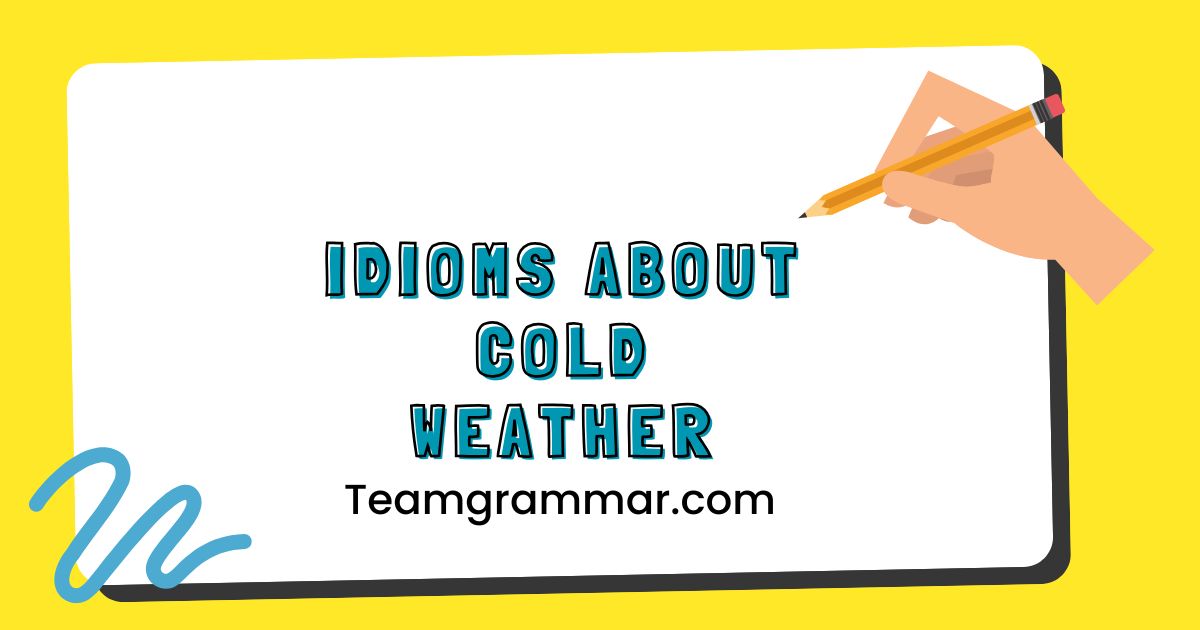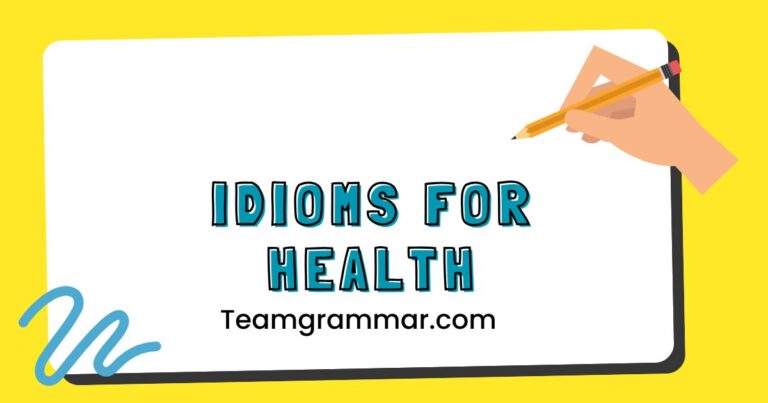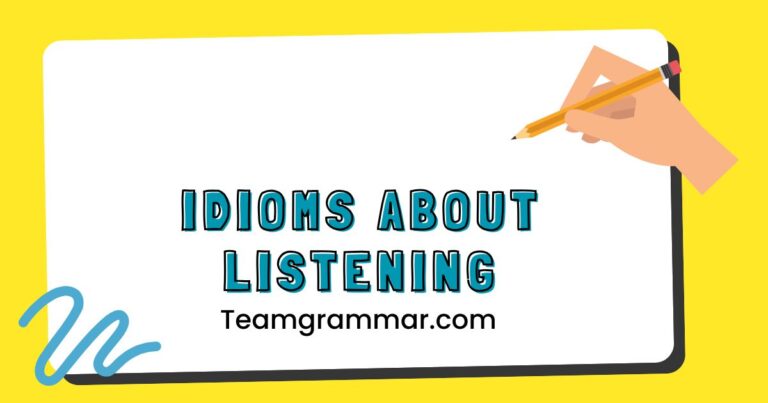33 Icy Expressions: Mastering Idioms About Cold Weather
Idioms add color and depth to the English language, allowing speakers to convey complex meanings in a concise and vivid way. Understanding idioms related to cold weather is particularly useful, as these expressions often reflect cultural attitudes toward winter and its associated challenges.
This article provides a comprehensive guide to common cold weather idioms, exploring their meanings, origins, and usage. Whether you’re an English language learner or a native speaker looking to expand your vocabulary, this resource will equip you with the knowledge to confidently use and interpret these frosty figures of speech.
By mastering these idioms, you’ll not only enhance your comprehension of English but also gain a deeper appreciation for the cultural nuances embedded within the language. This article is designed for English language learners of all levels, from beginner to advanced, as well as teachers and anyone interested in the intricacies of idiomatic expressions.
Table of Contents
- Introduction
- Definition of Idioms
- Structural Breakdown of Cold Weather Idioms
- Types and Categories of Cold Weather Idioms
- Examples of Cold Weather Idioms
- Usage Rules for Cold Weather Idioms
- Common Mistakes with Cold Weather Idioms
- Practice Exercises
- Advanced Topics in Cold Weather Idioms
- Frequently Asked Questions
- Conclusion
Definition of Idioms
An idiom is a phrase or expression whose meaning cannot be understood from the ordinary meanings of the words it contains. In other words, the meaning of an idiom is figurative, not literal.
Idioms are a crucial part of any language, adding richness and nuance to communication. Mastering idioms can significantly improve your understanding and fluency in English.
Idioms are often culturally specific and reflect the history, customs, and beliefs of a particular group of people. They are used in everyday conversation, literature, and media, making them essential for effective communication.
While idioms can sometimes be confusing for language learners, understanding them provides valuable insight into the culture and mindset of native speakers.
Classification of Idioms
Idioms can be classified in various ways, including:
- Phrasal Verbs: These are idioms that combine a verb with a preposition or adverb (e.g., bundle up).
- Proverbial Idioms: These express a general truth or piece of advice (e.g., there’s no such thing as bad weather, only bad clothes).
- Clichés: These are overused idioms that have lost their original impact (e.g., as cold as ice).
- Figurative Idioms: These use metaphors or similes to convey a meaning (e.g., nip in the air).
Function of Idioms
Idioms serve several important functions in communication:
- Adding Color: They make language more vivid and engaging.
- Conveying Nuance: They express subtle shades of meaning that might be difficult to articulate otherwise.
- Building Rapport: Using idioms correctly can make you sound more natural and fluent, helping you connect with native speakers.
- Cultural Understanding: They provide insight into the cultural values and beliefs of a language community.
Contexts of Use
Idioms are used in a wide range of contexts, including:
- Casual Conversation: Idioms are common in everyday speech among friends, family, and colleagues.
- Formal Writing: While less frequent, idioms can be used in formal writing to add emphasis or create a particular tone.
- Literature: Authors use idioms to create realistic dialogue and enrich their writing.
- Media: Idioms are often used in news reports, advertisements, and entertainment programs.
Structural Breakdown of Cold Weather Idioms
Understanding the structure of cold weather idioms can help you decipher their meaning and use them correctly. Many cold weather idioms are based on metaphors or similes, comparing the cold to something else to convey its intensity or effect.
Recognizing these patterns can make it easier to learn and remember these expressions.
Metaphorical Structure
Many cold weather idioms rely on metaphors, which are figures of speech that compare two unlike things without using “like” or “as.” For example, “icy stare” is a metaphor that compares someone’s cold, unfriendly gaze to the coldness of ice.
Simile Structure
Similes, on the other hand, use “like” or “as” to make a comparison. For instance, “as cold as ice” is a simile that directly compares something to the coldness of ice.
Phrasal Verb Structure
Some cold weather idioms are phrasal verbs, which consist of a verb and a preposition or adverb. “Bundle up” is an example of a phrasal verb idiom, meaning to dress warmly in many layers.
Descriptive Language
Cold weather idioms often use descriptive language to evoke a sense of coldness, such as “bitterly cold,” “freezing rain,” or “snowed under.” These expressions create a vivid image in the listener’s mind.
Types and Categories of Cold Weather Idioms
Cold weather idioms can be categorized based on their meaning or the specific aspect of cold weather they describe. Here are some common categories:
Temperature-Related Idioms
These idioms describe the degree of coldness. They range from mild to extreme cold.
Weather Condition Idioms
These idioms refer to specific weather conditions, such as snow, ice, or wind.
Effects of Cold Idioms
These idioms describe the effects of cold weather on people or things. They can refer to physical discomfort or emotional states.
Winter Activity Idioms
These idioms relate to activities commonly associated with winter, such as skiing, snowboarding, or ice skating.
Examples of Cold Weather Idioms
Here are several examples of cold weather idioms, categorized for clarity. Each idiom is accompanied by its meaning and example sentences to illustrate its usage.
Temperature-Related Idioms Examples
The following table provides examples of idioms that describe different degrees of coldness. The table includes the idiom, its meaning, and example sentences.
| Idiom | Meaning | Example Sentences |
|---|---|---|
| A nip in the air | A slight coldness in the air. | There’s a nip in the air this morning; you might want to grab a jacket. |
| Chilly reception | An unfriendly or unwelcoming greeting. | The new proposal received a chilly reception from the board members. |
| Cold as ice | Extremely cold, or lacking warmth or emotion. | Her heart was cold as ice after the betrayal. |
| Freezing cold | Extremely cold. | It’s freezing cold outside; make sure to wear a hat and gloves. |
| Bone-chilling | Extremely cold, penetrating to the bones. | The wind was bone-chilling, making it hard to stay outside for long. |
| Brass monkeys | Extremely cold (often used in the phrase “cold enough to freeze the balls off a brass monkey”). | It’s cold enough to freeze the balls off a brass monkey out there! |
| An icy stare | A cold, unfriendly look. | She gave him an icy stare when he interrupted her. |
| Left out in the cold | Ignored or excluded. | He felt left out in the cold when his friends went to the party without him. |
| Give someone the cold shoulder | To deliberately ignore someone. | She’s been giving me the cold shoulder ever since our argument. |
| In cold blood | Without emotion or remorse; deliberately. | The crime was committed in cold blood, shocking the entire community. |
| Cold feet | To become nervous or afraid at the last minute, especially before a big event like a wedding. | He almost got cold feet before the wedding, but he went through with it. |
| Cold comfort | Slight consolation, but not really helpful. | His apology was cold comfort after all the damage he had caused. |
| Out cold | Unconscious. | After the accident, he was out cold for several minutes. |
| Catch a cold | To become infected with a common cold virus. | I think I’m catching a cold; I have a sore throat and a runny nose. |
| Cold call | To make an unsolicited phone call to someone in an attempt to sell something. | He hates making cold calls because people are often annoyed. |
| Cold case | An unsolved criminal case that is no longer being actively investigated. | The detective decided to reopen the cold case in hopes of finding new evidence. |
| Cold hard cash | Actual money, in the form of bills and coins. | He prefers to be paid in cold hard cash rather than by check. |
| Throw cold water on | To discourage or dampen enthusiasm for something. | The manager threw cold water on the new project idea. |
| Run hot and cold | To alternate between two different attitudes or feelings. | She runs hot and cold about moving to a new city. |
| Cold fish | A person who is unemotional and unfriendly. | People say he’s a cold fish, but he’s just shy. |
Weather Condition Idioms Examples
The following table provides examples of idioms that describe different weather conditions associated with cold weather. The table includes the idiom, its meaning, and example sentences.
| Idiom | Meaning | Example Sentences |
|---|---|---|
| Snowed under | Overwhelmed with too much work or too many things to do. | I’m completely snowed under with assignments this week. |
| Snow job | A deceptive attempt to persuade someone with insincere talk. | Don’t fall for his snow job; he’s just trying to take advantage of you. |
| White as snow | Pure and innocent; spotless. | Her dress was white as snow for her wedding. |
| Snowball effect | A situation where something increases rapidly in size or intensity. | The small mistake had a snowball effect, leading to bigger problems. |
| Walking on thin ice | In a risky or precarious situation. | He’s walking on thin ice after making so many mistakes at work. |
| Skating on thin ice | Same as “walking on thin ice” – in a risky or precarious situation. | She knew she was skating on thin ice by bending the rules. |
| Blizzard of something | A large quantity or overwhelming amount of something. | After the announcement, there was a blizzard of emails in his inbox. |
| Under the weather | Feeling unwell. | I’m feeling a bit under the weather today, so I’m staying home from work. |
| Clear the air | To resolve a conflict or misunderstanding. | We need to clear the air after our argument last night. |
| Every cloud has a silver lining | There is something positive to be found in every negative situation. | Even though he lost his job, he knew that every cloud has a silver lining and he’d find something better. |
| Stormy weather | A period of trouble or difficulty. | Their relationship went through some stormy weather. |
| Weather the storm | To survive a difficult situation. | The company managed to weather the storm during the economic crisis. |
| Come rain or shine | No matter what happens. | I’ll be there for you, come rain or shine. |
| Rain on someone’s parade | To spoil someone’s enjoyment or plans. | I don’t want to rain on your parade, but I think your plan is unrealistic. |
| When it rains, it pours | When bad things happen, they often happen all at once. | First I lost my job, and then my car broke down; when it rains, it pours. |
| A storm in a teacup | A lot of unnecessary excitement and worry about something unimportant. | The argument was just a storm in a teacup; they’ll be friends again soon. |
| As right as rain | Feeling perfectly well. | After a good night’s sleep, I felt as right as rain. |
| Chase rainbows | To pursue unrealistic or impossible goals. | He’s always chasing rainbows, looking for the perfect job that doesn’t exist. |
| Head in the clouds | Not paying attention to what is happening around you; being impractical. | She always has her head in the clouds and doesn’t notice important details. |
| Cloud nine | A state of perfect happiness. | They were on cloud nine after their wedding. |
Effects of Cold Idioms Examples
The following table provides examples of idioms that describe the effects of cold weather on people or things. The table includes the idiom, its meaning, and example sentences.
| Idiom | Meaning | Example Sentences |
|---|---|---|
| Frozen stiff | Extremely cold and unable to move easily. | After waiting in the snow for an hour, I was frozen stiff. |
| Go into hibernation | To become inactive or withdrawn, like animals in winter. | After the busy holiday season, I just want to go into hibernation. |
| Ice over | To become covered with ice. | The roads iced over last night, making driving dangerous. |
| Turn frosty | To become unfriendly or hostile. | Her attitude turned frosty when she heard the bad news. |
| Numb with cold | Lacking sensation due to extreme cold. | My fingers were numb with cold after skiing all day. |
| Shiver me timbers | An expression of surprise or shock (often used humorously). | Shiver me timbers, that was a close call! |
| Snowed in | Unable to leave a place because of heavy snowfall. | We were snowed in at the cabin for three days. |
| Cold comfort | Slight consolation, but not really helpful. | His apology was cold comfort after all the damage he had caused. |
| Like a deer in headlights | To be frightened and unable to move or react. | When the boss asked him a question, he just stood there like a deer in headlights. |
| A fair-weather friend | Someone who is only a friend when things are going well. | He turned out to be a fair-weather friend; he disappeared when I needed help. |
| Break the ice | To make people feel more comfortable and relaxed. | Let’s play a game to break the ice at the beginning of the meeting. |
| Get wind of something | To hear a rumor or piece of information. | I got wind of the new project before it was officially announced. |
| Make hay while the sun shines | To take advantage of a good opportunity while it lasts. | We should make hay while the sun shines and finish the project early. |
| Every dog has its day | Everyone will have their moment of success or good fortune. | Even though he’s struggling now, every dog has its day. |
| Barking up the wrong tree | To be pursuing the wrong course of action or asking the wrong person. | If you think I’m responsible, you’re barking up the wrong tree. |
| Let sleeping dogs lie | To avoid stirring up trouble. | It’s best to let sleeping dogs lie and not bring up the past. |
| Raining cats and dogs | Raining very heavily. | It’s raining cats and dogs outside; I hope you brought an umbrella. |
| Have your head in the clouds | To be unaware or unrealistic about what is happening around you. | She’s always having her head in the clouds and doesn’t pay attention to details. |
| A drop in the bucket | A very small amount compared to what is needed. | The money we raised is just a drop in the bucket compared to the total cost. |
| Calm before the storm | A period of peace and quiet before a period of great activity or difficulty. | The calm before the storm is always nice, but I know things will get hectic soon. |
Usage Rules for Cold Weather Idioms
Using cold weather idioms correctly requires understanding their specific meanings and contexts. While idioms can add color to your language, using them inappropriately can lead to confusion or miscommunication.
Here are some rules to keep in mind:
Contextual Awareness
Always consider the context in which you are using an idiom. Some idioms are more appropriate for informal settings, while others can be used in formal situations.
Make sure the idiom fits the tone and style of your communication.
Audience Consideration
Be mindful of your audience when using idioms. If you are speaking to non-native speakers or people from different cultural backgrounds, it’s best to avoid using idioms that might be unfamiliar to them.
When in doubt, opt for clearer, more direct language.
Grammatical Agreement
Ensure that the idiom you are using agrees grammatically with the rest of your sentence. Pay attention to verb tenses, subject-verb agreement, and pronoun references.
Avoid Overuse
While idioms can enhance your language, avoid overusing them. Too many idioms in a single conversation or piece of writing can make your communication sound unnatural or forced.
Literal vs. Figurative
Remember that idioms are figurative expressions, not literal ones. Avoid interpreting them literally, as this can lead to misunderstandings.
Common Mistakes with Cold Weather Idioms
Even experienced English speakers sometimes make mistakes when using idioms. Here are some common errors to watch out for:
Misinterpreting the Meaning
One of the most common mistakes is misinterpreting the meaning of an idiom. This can happen if you try to understand the idiom literally, rather than figuratively.
Always double-check the meaning of an idiom before using it.
Incorrect: “He gave me a cold shoulder, so I offered him a blanket.” (Misinterpreting “cold shoulder” as literal coldness.)
Correct: “He gave me the cold shoulder, so I knew he was still angry.” (Understanding “cold shoulder” as ignoring someone.)
Using the Wrong Words
Another common mistake is using the wrong words in an idiom. Idioms are fixed expressions, so changing even one word can alter the meaning or make the idiom nonsensical.
Incorrect: “I’m feeling under the weather today.”
Correct: “I’m feeling under the weather today.”
Mixing Idioms
Mixing two or more idioms together can create a confusing and nonsensical expression. Avoid combining parts of different idioms.
Incorrect: “Let’s break the ice and weather the storm.” (Mixing “break the ice” and “weather the storm.”)
Correct: “Let’s break the ice and get to know each other.” (Using “break the ice” correctly.)
Correct: “We need to weather the storm and get through this difficult time.” (Using “weather the storm” correctly.)
Incorrect Grammatical Usage
Using idioms with incorrect grammar is another frequent error. Ensure that the verb tense and sentence structure are correct when incorporating an idiom.
Incorrect: “He had cold feet before to get married.”
Correct: “He had cold feet before getting married.”
Practice Exercises
Test your understanding of cold weather idioms with these practice exercises. Choose the correct idiom to complete each sentence.
Exercise 1: Multiple Choice
Choose the correct idiom to complete each sentence.
| Question | Options | Answer |
|---|---|---|
| 1. After losing the game, the team felt __________. | a) snowed under b) left out in the cold c) under the weather | b) left out in the cold |
| 2. She gave him _________ when he arrived late. | a) a nip in the air b) a chilly reception c) cold feet | b) a chilly reception |
| 3. It was _________ outside; I could barely feel my fingers. | a) a cold fish b) bone-chilling c) clear the air | b) bone-chilling |
| 4. I’m _________ with work this week. | a) snowed under b) walking on thin ice c) under the weather | a) snowed under |
| 5. He’s _________ after making so many mistakes. | a) skating on thin ice b) snowed in c) feeling as right as rain | a) skating on thin ice |
| 6. I am feeling a little _________ today, so I won’t be able to go out. | a) under the weather b) raining cats and dogs c) walking on thin ice | a) under the weather |
| 7. The company managed to _________ during the recession. | a) rain on someone’s parade b) weather the storm c) clear the air | b) weather the storm |
| 8. Even though he is struggling now, remember that _________. | a) every dog has its day b) it’s raining cats and dogs c) calm before the storm | a) every dog has its day |
| 9. She is always _________ and doesn’t pay attention to details. | a) having her head in the clouds b) a drop in the bucket c) calm before the storm | a) having her head in the clouds |
| 10. It was the _________ before the busy season began. | a) every dog has its day b) it’s raining cats and dogs c) calm before the storm | c) calm before the storm |
Exercise 2: Fill in the Blanks
Fill in the blanks with the appropriate cold weather idiom.
| Question | Answer |
|---|---|
| 1. After the argument, they needed to ___________. | clear the air |
| 2. He got _________ before his big presentation. | cold feet |
| 3. It’s _________ outside; you should wear a warm coat. | freezing cold |
| 4. She felt _________ when her friends didn’t invite her to the party. | left out in the cold |
| 5. The roads were _________ after the ice storm. | iced over |
| 6. He’s always _________, pursuing unrealistic dreams. | chasing rainbows |
| 7. They were _________ after their amazing vacation. | on cloud nine |
| 8. I’ll support you, _________. | come rain or shine |
| 9. Don’t _________ on my parade with your negativity. | rain |
| 10. The news spread like a _________ through the town. | wildfire |
Advanced Topics in Cold Weather Idioms
For advanced learners, exploring the origins and cultural contexts of cold weather idioms can provide a deeper understanding of their meaning and usage. Here are some advanced topics to consider:
Etymology of Idioms
Researching the etymology, or origin, of cold weather idioms can reveal fascinating insights into their historical and cultural roots. For example, the idiom “cold shoulder” is believed to have originated from the practice of serving a less desirable cut of meat (the cold shoulder of mutton) to unwanted guests.
Cultural Variations
Idioms often vary across different cultures and regions. Exploring the cultural variations of cold weather idioms can help you understand how different societies perceive and respond to cold weather.
Some cultures may have idioms that emphasize the challenges of winter, while others may focus on the beauty and opportunities it presents.
Literary Analysis
Analyzing the use of cold weather idioms in literature can provide a deeper appreciation for their artistic and expressive potential. Authors often use idioms to create vivid imagery, develop characters, and convey complex themes.
Examining how idioms are used in different literary genres can enhance your understanding of their nuances and subtleties.
Frequently Asked Questions
Here are some frequently asked questions about cold weather idioms:
- What is an idiom?
An idiom is a phrase or expression whose meaning cannot be understood from the ordinary meanings of the words it contains. It’s a figurative expression that has a different meaning than its literal interpretation.
- Why are idioms important?
Idioms add color and depth to the English language, allowing speakers to convey complex meanings in a concise and vivid way. Understanding idioms is crucial for effective communication and cultural understanding.
- How can I learn idioms more effectively?
The best way to learn idioms is through exposure and practice. Read widely, listen to native speakers, and try to use idioms in your own conversations and writing. Keep a notebook of new idioms and review them regularly.
- Are idioms the same in all languages?
No, idioms are often language-specific and culturally bound. What is an idiom in one language may not have a direct equivalent in another. This is why it’s important to learn idioms in context and understand their cultural nuances.
- Can I use idioms in formal writing?
While idioms are more common in informal settings, they can be used in formal writing to add emphasis or create a particular tone. However, it’s important to use them sparingly and choose idioms that are appropriate for the audience and purpose of your writing.
- What should I do if I don’t understand an idiom?
If you encounter an idiom you don’t understand, ask for clarification or look it up in a dictionary or online resource. Pay attention to the context in which the idiom is used, as this can provide clues to its meaning.
- How can I avoid making mistakes with idioms?
To avoid making mistakes with idioms, double-check their meaning and usage before using them. Pay attention to grammatical agreement and avoid mixing idioms together. When in doubt, opt for clearer, more direct language.
- Are there any resources for learning more about idioms?
Yes, there are many resources available for learning more about idioms, including dictionaries, online databases, and language learning websites. Some popular resources include the Oxford English Dictionary, Merriam-Webster, and Idioms.com.
- What is the origin of the idiom “raining cats and dogs”?
The exact origin is uncertain, but theories include: thatched roofs being slippery, causing animals to fall during heavy rain; “cats and dogs” being slang for animal carcasses and strong winds, respectively; or a corruption of the French word “catadoupe,” meaning waterfall.
- Is it rude to ask someone to explain an idiom?
Generally, no. Most people are happy to explain an idiom if you ask politely. It shows you’re interested in learning and understanding the language better. It’s a great way to improve your language skills!
Conclusion
Mastering idioms about cold weather can significantly enhance your understanding and fluency in English. These expressions add color and nuance to your language, allowing you to communicate more effectively and connect with native speakers on a deeper level.
By understanding the definitions, structural breakdowns, and usage rules of these idioms, you can confidently incorporate them into your conversations and writing.
Remember to practice using idioms regularly and pay attention to the context in which they are used. Be mindful of your audience and avoid overusing idioms in formal settings.
With consistent effort and attention to detail, you can master the art of using cold weather idioms and elevate your English language skills to new heights. Continue to explore the rich tapestry of idiomatic expressions and embrace the challenges and rewards of language learning.







